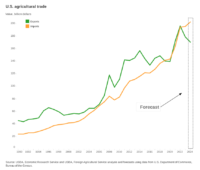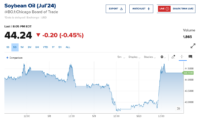Bloomberg's Clarice Couto reported this past Friday that "a surprising tax change in agriculture powerhouse Brazil has the potential to make soy grown in the world’s largest bean exporter less…
Welcome News on Trade, But Unresolved Issues Linger
Executive branch policy action last week resulted in some very welcome good news for U.S. agriculture. Metal import tariffs on Canada and Mexico were lifted, improving the outlook for the USMCA Agreement, and a decision to apply U.S. tariffs on cars from the EU and Japan was postponed. Also last week, Secretary of Agriculture Sonny Perdue announced a breakthrough agreement opening additional U.S. beef exports to Japan. Nonetheless, recent news reports document that trade issues, particularly with China, continue to suppress the outlook for U.S. farmers.
Metal Tariffs Lifted, Auto Tariffs Postponed
Ana Swanson reported on the front page of Saturday’s New York Times that, “President Trump agreed on Friday to lift tariffs on metal imports from Mexico and Canada, removing a major irritant for two important allies that in exchange agreed to stop punishing American farmers with their own taxes on pork, cheese and milk.
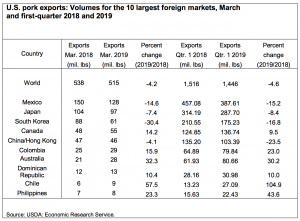
“At the same time, Mr. Trump postponed a decision on whether to impose tariffs on automobiles imported from Europe, Japan and other countries for six months, setting a tight deadline for the United States to reach trade deals that have so far proved elusive.”
Together, the actions remove the threat of an all-encompassing global trade war and allow Mr. Trump to focus on pushing China to agree to the United States’ trade terms, as well as pressuring Europe and Japan to reach a trade deal before the 2020 election. His trade war has hurt many of the farmers who make up his political base, and he is eager to make good on a 2016 campaign promise to rewrite trade deals in America’s favor.
More narrowly with respect to the EU, Wall Street Journal writers Vivian Salama and Josh Zumbrun and Emre Peker reported on Friday that, “Trans-Atlantic differences over agriculture are bedeviling talks, with the EU refusing Washington’s demand for U.S. access to European food markets.”
EU's ambassador is trying to hurt American agriculture by saying we can't negotiate w EU on ag in a new trade deal Sounds like they are trying to pull one over on Pres Trump to the detriment of American farmers Pres Trump/USTR Lighthizer R too smart 4 that!
— ChuckGrassley (@ChuckGrassley) November 28, 2018
“While the negotiations with China have drawn much of the administration’s energy, EU and U.S. negotiators met in Washington over recent weeks, seeking to push along the slow-moving talks. Mr. Trump has repeatedly said he would resort to tariffs if no deal is reached. The president had agreed with the EU not to impose any new tariffs as long as trade talks continue, and the EU has warned it would halt negotiations if hit with automotive tariffs, and retaliate.”
Starting Monday, our great Farmers can begin doing business again with Mexico and Canada. They have both taken the tariff penalties off of your great agricultural product. Please be sure that you are treated fairly. Any complaints should immediately go to @SecretarySonny Perdue!
— Donald J. Trump (@realDonaldTrump) May 20, 2019
And while discussing Japan, the Journal writers noted that, “The U.S. has also been in ongoing talks with Japan, the source of about $56 billion of automobile imports. Those talks have been progressing more easily than those with Europe.”
Saturday’s Journal article also explained that, “In addition to needing more time to negotiate with China, the Trump administration also is pursuing congressional approval for its renegotiated trade pact with Canada and Mexico.”
The U.S., Canada, & Mexico agreed to lift all Sec. 232 #steel & #aluminum #tariffs, including retaliatory tariffs! This is a huge relief for #agriculture as our North American allies are some of our largest markets. I hope this propels momentum for my colleagues to pass #USMCA.
— Rep. Vicky Hartzler (@RepHartzler) May 17, 2019
David Lynch, Emily Rauhala and Damian Paletta reported on the front page of Saturday’s Washington Post that, “Senate Republicans, including Sen. Charles E. Grassley of Iowa, the powerful Finance Committee chairman, had said they would not approve the [USMCA] deal while the [metal] tariffs were in place.
“Iowa farmers were among the casualties of Mexican retaliatory tariffs, which cut deeply into U.S. agricultural exports. The Mexican tariffs, and similar Canadian levies, also are being eliminated.”
Thank u Mr President for really helping the farmers of Iowa w this important step in USMCA. w lifting metal tariffs @realdonaldtrump just proved he can deliver on negotiations China ought to take note/start dealing in good faith & take Pres Trump seriously
— ChuckGrassley (@ChuckGrassley) May 17, 2019
Nonetheless, Don Lee pointed out on the front page of Saturday’s Los Angeles Times that, “But the North American deal remains far from assured of ratification by Congress, which is required before it can go into effect. Congressional Democrats have said they would not support the agreement unless changes were made to provisions on enforcing labor rights and the duration that drug companies can keep exclusivity for their products.”
Japan Open to More U.S. Beef
An update on Friday from USDA’s Foreign Agricultural Service (“Japan Lifts Age Restriction on U.S. Beef “) stated that, “On May 17, Japan formally removed the requirement that U.S. beef exported to Japan be derived from cattle less than 30 months of age. U.S. exporters can now export beef from cattle of any age to Japan for the first time since 2003. Expanded access could increase U.S. exports to Japan by up to $200 million annually.”
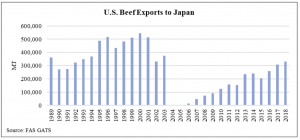
The FAS update stated that, “In December 2003, Japan banned U.S. beef and beef products following the detection of BSE in a dairy cow imported into the United States from Canada. In December 2005, partial access was restored to U.S. beef muscle cuts and offal items from cattle 20 months of age and younger. In February 2013, Japan extended access to include beef and beef products from cattle less than thirty months of age.”
This is good news, but there’s more work ahead of us, and I’ll continue to work with and pressure the administration to wrap up trade negotiations around the world, open new markets and expand existing markets, and provide producers with the certainty they deserve.
— Senator John Thune (@SenJohnThune) May 17, 2019
Friday’s update indicated that, “Japan is the largest overseas market for U.S. beef, accounting for 25 percent of all U.S. beef exports in 2018.
Another trade breakthru 2day w Japan lifting restrictions on US beef products. US beef into Japan has been 1 of the most difficult trade issues US has dealt w over 2 decades It’s only 2nd to Europe’s refusal to take GMOgrains Japan market will really help Iowa cattlemen
— ChuckGrassley (@ChuckGrassley) May 17, 2019
“In 2018, the United States exported 330,000 metric tons (MT) of beef and beef products to Japan, valued at $2.1 billion.”
TN a top beef-producing state too. Looking forward to more, improved trade deals that benefit American farmers, ranchers. Under this Admin, Argentina allowed U.S. pork exports for first time in 2 decades. USMCA on the way! https://t.co/TVaBxkZiGb
— Scott DesJarlais (@DesJarlaisTN04) May 18, 2019
FAS added that, “While U.S. beef exports have rebounded remarkably since the market closure in 2003, export volumes have not yet fully recovered to pre-BSE levels. In 2003, U.S. beef exports totaled 375,000 MT. USDA estimates that the removal of age-based restrictions on U.S. beef could increase exports to Japan by up to ten percent on a value basis, or by approximately $200 million, annually.”
Ongoing Trade Spats Cloud Export Prospects
Adam Belz reported on the front page of Friday’s Minneapolis Star Tribune that, “Late spring planting, as is happening this year in Minnesota, tends to weaken the fall harvest and lift prices on crops.
“But not when there’s a trade war.
Farmers now face the prospect of both a smaller crop and lower prices — particularly for soybeans — thanks to the latest round of tit-for-tat tariff fighting between the United States and China.
The Star Tribune article stated that, “Farmers in Minnesota have been harder hit than most, since a sizable portion of the state’s soybeans are grown for export to China. Farmers all over the country are muddling through a four-year down cycle in corn and soybean prices. Soybeans still haven’t recovered from their initial drop when the trade war started last summer. Soybean farmers were bailed out by the Trump administration with direct payments of $1.65 per bushel for their 2018 harvest.”
Video@SecretarySonny says @realDonaldTrump is committed to supporting #farmers during #trade dispute with #Chinahttps://t.co/UR1QalDXFQ
— Farm Policy (@FarmPolicy) May 20, 2019
And Bryan Lowry, writing on the front page of Saturday’s Kansas City Star, pointed out that, “This week soybean prices dropped to a ten-year low of less than $8 a bushel in anticipation of Chinese retaliation to U.S. tariffs next month. Wheat, corn and other Midwest staple crops have also experienced drops in price over the last two years.”
The KC Star article indicated that, “Other lawmakers are losing their patience with the situation.
‘We need to get back to the table,’ said Sen. Pat Roberts, the Kansas Republican who chairs the Senate Agriculture Committee. ‘If we can’t get a breakthrough with China and we are continuing to use tariffs and use tariffs and use tariffs, you’re going to continue to have retaliation, retaliation, retaliation.’
Bloomberg writer Michael Hirtzer reported Friday that, “It’s increasingly unlikely that American farmers will fully regain their share of the lucrative Chinese soybean market, a U.S. industry group said.
“U.S. exports of the oilseed to the biggest importing nation have plunged in the year since the world’s two largest economies begin tit-for-tat tariffs.
“‘The longer we are out of the China market, the likelihood is that we will not regain all of the share or all of the volume,’ Paul Burke, a senior director at the U.S. Soybean Export Council, said on a conference call Friday.”
Wall Street Journal writers Josh Zumbrun and Jesse Newman reported on Friday that, “Stalled trade talks between Beijing and Washington are exacerbating a slump in the U.S. Farm Belt, and many farmers don’t believe an aid package being assembled by the Trump administration will be enough to compensate for the economic damage.”
The other interesting MFP item is the campaign by National Corn Growers Association to get their fair share this time. Using the hashtag #apennywontcutit. My guess is that $20B won’t be enough when all is said and done
— Scott Irwin (@ScottIrwinUI) May 17, 2019
The Journal writers stated that, “Exacerbating the slump is severe flooding in the Midwest this year, which has dealt farmers a separate blow, swamping grain bins, inundating fields and washing away livestock in farm states such as Nebraska and Iowa. Elsewhere, cold and wet weather has delayed spring planting, sowing anxiety over the prospects for this year’s crops.”
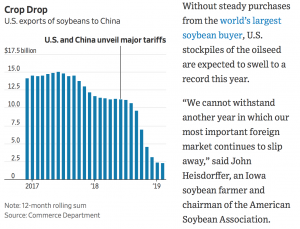
“The 2018 farm aid package authorized about $12 billion of spending under several different programs. Last week, President Trump directed the USDA to begin work on a new program. The agriculture secretary, Mr. Perdue, told reporters on Wednesday that the new package would resemble the program from 2018,” the Journal article said.
Also Friday, Bloomberg writer Mike Dorning reported that, “President Donald Trump’s escalation of the trade war with China without a concrete plan to aid farmers could worsen the rising stockpiles of U.S. crops such as soybeans and depress commodity prices even after the current dispute is resolved.
“The Trump administration is signaling that the aid package it’s assembling would make payments to farmers based on their current crop production, raising concern among analysts and some lawmakers.”
“The administration’s signals on trade aid has sowed confusion and the sense that a $15 billion or even $20 billion program with major ramifications for agriculture and commodity markets is being improvised on the fly,” the Bloomberg article said; adding that, “‘Because of planting, there probably isn’t a worse time for the president to go out and announce a payment to farmers,’ said Jonathan Coppess, former head of the U.S. Farm Service Agency [and now an agricultural policy professor at the University of Illinois], which oversees farm subsidies.”






